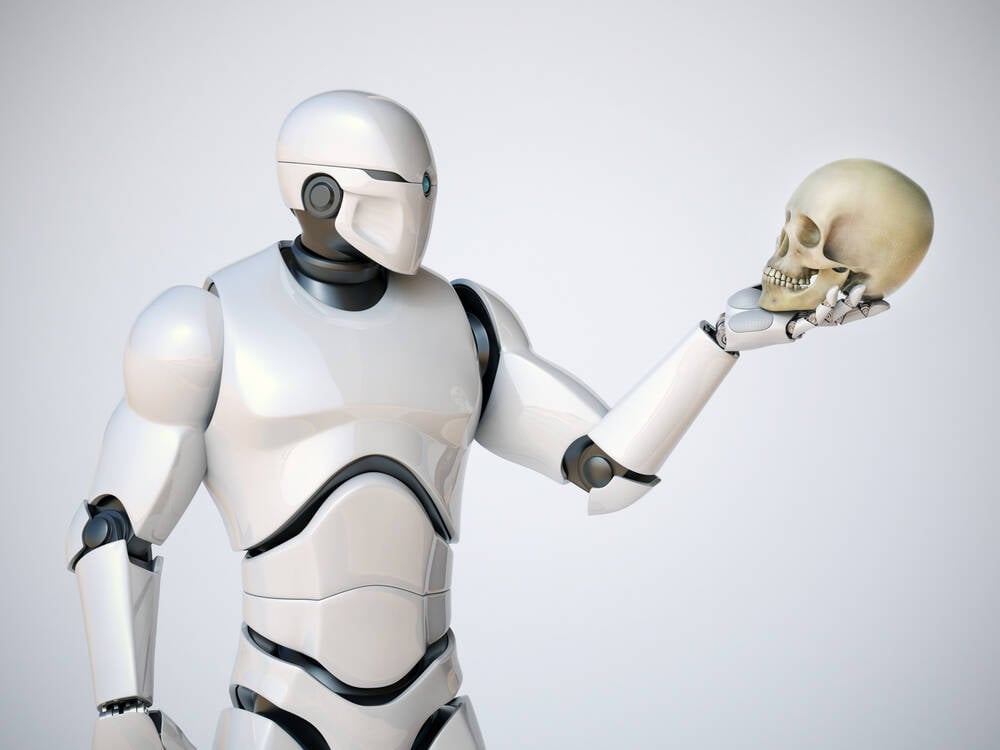This is how AI will take over… not through wars or competence, but by being better at bureaucratic forgeries…
Edit: well, I guess the apple never falls far from the tree, as it were! Wa-hey! We wanted to create the ultimate worker, but we’ve managed to create the ultimate politician instead=))
This.
AI politicians might be the move after next.
Corporate personhood(you are here) ->
Corporation self advocates ->
Corporations run for officeI don’t like this future. I’d like to go back.
I hate to break it to you….
I said I DON’T LIKE THIS FUTURE. I’D LIKE TO GO BACK
then start preparing for a revolution, they won’t stop if we don’t depose them.
It’s easy when the first line of every reply is “oh, you’re so goddamn smart. Holy shit, are you the smartest person in the world for asking that question?..”
AI isn’t taking the jobs, dipshit rich assholes are cutting the jobs. Taking a job implies doing the job, and from that perspective, the remaining people who weren’t laid off are taking the jobs, not AI.
It hasn’t taken any jobs, but this will keep being repeated so it can be used as a bludgeon against pay rises and keeping up with inflation.
‘you’re lucky to have a job’
It hasn’t taken any jobs
Microsoft to cut up to 9,000 more jobs as it invests in AI
Hundreds of Google AI Workers Were Fired Amid Fight Over Working Conditions
Tesla’s layoffs hit Autopilot team as AI develops
A lot of these bozos are drinking their own Kool-aid. They’re laying off internal teams in droves and pivoting to “Vibes Coding” as a presumably more efficient method of internal devleopment.
I disagree, I have literally heard of people being laid off because managers think that AI can and will replace actual workers, I have literally seen it too. It’s already happening.
Yeah, it just hasn’t taken any of those jobs, apparently.
Corporations are firing and laying off labor, but that labor is not being done by AI-- it’s simply falling on those who are still employed or not getting done at all.
I resigned from an international public accounting firm due to having AI forced on very sensitive and delicate projects in order to lower costs. As a professional, every alarm bell went off and I left because I could be held liable for their terrible managerial decisions.
They told me they were sad to see me go, but AI is the future and hope I changed my mind-- this was all back in April.
Not only did AI fail to do a fraction of the work we were told it was going to do, it caused over $2MM in client damages that the firm then used to justify the firing of the remaining members of the projects’ team for failing to properly supervise the AI, even though every manager struggles to open a PDF.
AI is not the future because it is literally only capable of looking backwards.
AI is a performative regurgitation of information that real people put the time and energy into gathering, distilling, refining, and presenting to others to evaluate and contribute to.
Even worse, AI demonstrably makes its users dependent and intellectually lazy. If you think about it, the more prevalent AI usage becomes, the less and less capable people will be left to maintain it. And to all the fools crying out that AI will take care of itself or robots will, I say:
All LLMs are hallucinating and going psychotic, and that is not something that can be fixed due to the very nature of how LLMs work.
AI is not intelligent. And while it could be, that would take far too much energy and resources to make cost-effective machines with as many neural connections present in the brain of an average MAGA voter-- and that is already a super a low bar for most of us to clear.
Well my AI says it will take 96 or 98 million jobs, depending on what you want it say and only for $5,000.
Thus demonstrating the crux of the issue.
I was just looking for a name of a historical figure associated with the Declaration of Independence but not involved in the writing of it. Elizabeth Powel. Once I knew the name, I went through the ai to see how fast they’d get it. Duck.ai confidently gave me 9 different names, including people who were born on 1776 or soon thereafter and could not have been historically involved in any of it. I even said not married to any of the writers and kept getting Abagail Adams and the journalist, Goddard. It was continually distracted by “prominent woman” and would give Elizabeth Cady Stanton instead. Twice.
Finally, I gave the ai a portrait. It took the ai three tries to get the name from the portrait, and the portrait is the most used one under the images tab.
It was very sad. I strongly encourage everyone to test the ai. Easy to grab wikis that would be top of the search anyway are making the ai look good.
LOL Maybe AI will be the next big job creator. The AI solves a task super fast, but a human has to sort out the mistakes, and spend twice the time doing that, than it would have taken to just do it yourself.
This what’s happening in computer programming. The booming subfield is apparently slop cleaners.
If you understand how LLMs work, that’s not surprising.
LLMs generate a sequence of words that makes sense in that context. It’s trained on trillions(?) of words from books, Wikipedia, etc. In most of the training material, when someone asks “what’s the name of the person who did X?” there’s an answer, and that answer isn’t “I have no fucking clue”.
Now, if it were trained on a whole new corpus of data that had “I have no fucking clue” a lot more often, it would see that as a reasonable thing to print sometimes so you’d get that answer a lot more often. However, it doesn’t actually understand anything. It just generates sequences of believable words. So, it wouldn’t generate “I have no fucking clue” when it doesn’t know, it would just generate it occasionally when it seemed like it was an appropriate time. So, you’d ask “Who was the first president of the USA?” and it would sometimes say “I have no fucking clue” because that’s sometimes what the training data says a response might look like when someone asks a question of that form.
This shit’s so embarrassing
Knowing the way our country is going I would expect in the end workers will have to pay an AI tax on their income and most workers will start working 50 hours a week.
I like you optimism that it won’t be worse than that. 😋
and then 115 million will be needed to unwind the half-assed implementation and inevitable damage.
And over the next 50 years it will take 485 million jobs, and the unemployment rate will be 235%.
And we’ll all be dead.
Here’s hoping!
My prediction is that AI, as in LLMs, will be responsible for 0 net jobs lost but simultaneously responsible for many companies going under.
People will lose their jobs to AI in the same way that lumberjacks lose their job to forest fires.
The Senate will decide its fate.
Yes but got forbid those jobs be stolen by another country. Can’t have that.
I.e., made up on the spot.
I don’t think the purported numbers themselves are that important, the key bit is that AI is an advancing technology over this century. If we don’t rework our society to account for an oncoming future, people will get run over.
If there is an overhaul of my nation’s Constitution, I would like economics to be addressed. One such thing would be a mechanical ruleset that adjusts the amount of wealth and assets a company can hold, according to employee headcount. If they downsize the amount of working humans, their limit goes down. They can opt to join a lotto program, that grants UBI to people whose occupation is displaced by AI, and each income that is lotto’ed by the company adds to their Capital Asset Limit.
One such thing would be a mechanical ruleset that adjusts the amount of wealth and assets a company can hold, according to employee headcount.
Expert here. That’s a bad idea. Example: a small law firm, 10 employees including owners/partners/I don’t care how they’re organized. They have 3 bank accounts: their payroll account, their operating fund (where all their nonpayroll expenditures are made) and their client liability account. None of the money in that account is actually theirs, they just hold it while waiting for clients to cash their settlement checks.
Proportionally, at least at the firm I’ve consulted with, their client liability account is several orders of magnitude larger than either of the other accounts. Technically the money isn’t theirs, they are just custodians, and the interest from that account is their bar association dues.
My point is, certain asset caps may look appropriate for one industry and simultaneously be absolutely disruptive to others.
What is it you’re an expert of, here? Game theory? Or do you mean you’re a lawyer?
If you’re a lawyer, you are not an expert on formulating a society. We’ve let lawyers run things for a long time and look at where it’s gotten us.
The system needs to promote positive, human centric outcomes. Maybe having clients with that much wealth isn’t fundamentally a positive outcome? Perhaps that idea needs to be reworked as a part of the oncoming changes?
In other words, anyone dealing with a certain threshold of wealth needs to hire human beings in order to raise their cap. I like this idea a lot actually. The bigger the clients, the more they have to pay if they want legal representation. For billionaires, legal representation would cost an absolute fortune and provide income to thousands of people.
Honestly I haven’t thought of this pattern but the more I think about it, the better it seems.
Maybe having clients with that much wealth isn’t fundamentally a positive outcome?
let’s remove the ability of people to sue for damages when they’re injured, that’s ALSO a positive societal goal.
where do you think that money came from?
Preferably, yes. Ideally, we are all insured by a single payer system and in the case of an accident, people are compensated via that insurance.
No legal bank account needed.
Next point?
oh, you want to argue. accidents are a very small subset of legal injuries
I am not looking to argue. I just don’t think there is a future for the law profession in a post-scarcity society. Disagreements will occur and negotiations will exist, but there are better ways to resolve them.
Ideally, lawyers, marketers, bankers, and politicians will no longer be needed. They can all be automated.
i mean, ideally everything can be automated. the reason we have lawyers is because there is (usually intentional) wiggle room in the law, and people sometimes need more than “society runs better if we honor our word” to act with integrity, follow the law, or put their shoppings cart back. some people need the stick of legal repercussions all of the time. automating politicians (unless you are going for a direct democracy, which no one has the time for) concentrates power in the hands of the people maintaining the automation. i agree with you on the other two, but i’m sure i could find justifications for human intervention in their processes if i tried. not to mention there’s a certain amount of ingenuity and talent that AI can’t duplicate. nearly everything i’ve seen that’s AI produced lacks soul.
also, i’m not a lawyer, i am just occasionally an expert witness or forensic analyst for some law firms and have some lawyers in the family. I specialize in one federal and two state titles, but again, i provide analysis i don’t practice law. my career has spanned four or five marginally related disciplines so not quite sure what to call me
As a more general principle, don’t build nitpicky implementation detail into a strategy document. That’s how you get brainfarts like the 3/5 compromise.
In that case, what would you believe to be an appropriate solution for your industry? I would like your viewpoint, it might refine my concept a bit further*.
*My approach is assuming a scenario that can be broadly be described as ‘What if FDR failed to save capitalism?’, or a total breakdown of the economic reality we know. That is the sort of thing that the Framers of America did when they made the Constitution. They formalized rules on preventing absolute political power, so I am looking for something similar regarding economic gaps.
There’s a few ways to account for it. i mean, if you are doing Net Assets (Assets-Liability), that’s just Equity and having a limit on the total Equity a business is able to carry at specific sizes feels like it’s incentivizing the wrong things.
It’s kind of interesting to see the changes in investment rates that happened when the tax rate dropped from 90% on anything over a million in annual income. People would essentially buy losses (invest in businesses that were struggling) in order to keep from having to pay the government more. So struggling businesses got a little more capital to survive. Simply changing the top personal/corp income tax rate to something draconian at some arbitrarily high amount can have transformative effects on a society. that’s where i’d start.
I’ve thought a good one would be to have all publicly traded business allocate 15% equity to employees, and require a seat on the board for an employee elected representative. Employees should be allowed to vote to sell off a certain amount every quarter, and any stock buybacks would go into the employee pool until the 15% is reached again.
I have a feeling that this is different from Beeg’s concern about client assets, but more about employee influence over the company? The idea of an equity limit might be a good addition to the Universal Ranked Income concept that I have cobbled together. Thank you. :)
In any case, my notes has two things about my own take:
1: Employees can vote for whether someone can obtain and retain their leadership position within their chapter and for higher rungs of the organization. Also, the pay grade of those leaders. Employees who are fired or retired from the company will receive 1:1 retirement pay over time, equal to the days and pay grade that they worked at the company, and can vote on any position of the company or those it has merged with. This essentially means that legacy employees can determine the leadership of the company, and cannot be made to ‘go away’ in a political sense.
2: Stocks when sold, have two components. The first is that they pay an amount over a fixed time, that is more than what they were paid for. It cannot be be sold nor traded, until it has been exhausted of this payback value. When exhausted of value, the share can now be traded to another individual for money, or returned to the company for the value it was bought at. The company cannot refuse the return, nor offer an increased price. A share returned to the company can be reissued, which allows it to start paying the fixed value again. Secondly, people who hold a share can vote for company leadership*. People within leadership positions at the company cannot own stocks from their own organization.
By requiring stocks to be held for a certain time before they can be traded, it makes it harder for stockholders to hoard and dispose of stocks when convenient. The gradual payout is a reward to people who buy stocks from the company. Presumably, the inability of stocks to have guaranteed value when they become tradeable will promote their return to the company.
*It is assumed that we are operating within an economic system, where there are absolute wealth and asset caps. There is only so many shares a person can possess, and holding shares can prevent someone from owning a yacht or bigger house - they have to lose the shares to make room within the cap for things they enjoy. This helps limit the influence of individual stock holders.
“If there is a massive overhaul, I would like to use this once in a century event to enact minimal changes that will help to keep the capitalist system in place.”
thats UE4 Manny lol













